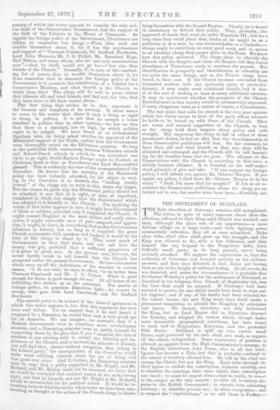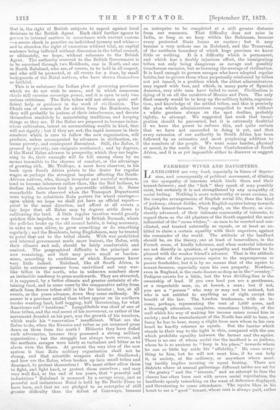THE SETTLEMENT OF ZULULAND,
THE Zulu desertion of Cetewayo remains still unexplained. The tribes, in spite of many rumours about their dis- affection, adhered to their King until Ulundi was reached, and then, although the place was of no importance—a mere African village on a large scale—and their fighting power substantially unbroken, they all at once submitted. Tribe after tribe, chief after chief, gave up the struggle, and the King was allowed to fly, with a few followers, and hide himself like any brigand in the Neapolitan hills, Lord Gifford's small party, in its long pursuit, never being seriously attacked. We suppose the explanation is, that the authority of Cetewayo was founded entirely on his military prowess, and that once defeated, it died, Zulus not having risen as yet to the height of national feeling. At all events, he was deserted, and under the circumstances it is probable that Sir Garnet Wolseley's policy for the settlement of Zululand, as described in his telegram from Ulundi of September 1st, was the best that could be adopted. If Cetewayo had been restored to power, his one object would have been to wipe out his disgrace ; and if any of his family had been selected for the vacant throne, the new King must have lived under a permanent temptation to rebuild the Kingship by enterprise and terror. Sir Garnet, therefore, not only dethroned the King, but as Lord Napier did in Abyssinia, deposed the dynasty, and adopted the system which, though under more favourable geographical conditions, has been found to work well in Rajpootana, Kattywar, and the protected Sikh States. Zululand is split up into twelve small States, each governed by its own chief, and each, as regards all the others, independent. Some superiority of position is allowed, as appears from the High Commissioner's message, to the English adventurer, John Dunn, who in all but intel- ligence has become a Zulu, but this is probably confined to the extent of territory allowed him. He will be the chief one among the Chiefs, but not the King. Each tribe through its chief agrees to abolish the conscription hitherto existing, and to abandon the marriage laws upon which that conscription was based ; to cease to import arms—that is, really, to revert to the assegai as the only weapon ; to refer all boundary dis- putes to the British Government ; to abstain from alienating territory ; to abandon private war ; to allow emigration ; and to respect the "capitulations," as we call them in Turkey,— that is, the right of British subjects to appeal against local decisions to the British Agent. Each chief further agrees to govern in internal matters in accordance with ancient custom —a severe check in practice on individual tyranny and whim— and to abandon the right of execution without trial, no capital sentence being inflicted without discussion in the tribal council, or ultimately, we hope, without reference to the British Agent. The authority reserved to the British Government is to be exercised through two Residents, one in North and one in South Zululand, who are, of course, to be held in all respect, and who will be protected, at all events for a time, by small bodyguards of the Natal natives, who have shown themselves so faithful.
This is in substance the Indian plan of governing provinces which we do not wish to annex, and in which numerous chiefs still exercise sovereign power, and it is open to only two serious criticisms. The Zulu tribes will not obtain quite suf- ficient help or guidance in the work of civilisation. The Chiefs can of course ask for advice from the Residents, but they will probably be jealous of their interference, and devote themselves resolutely to maintaining traditions, and keeping things as they are. If the Zulus are prepared to become indus- trious cultivators, intent on accumulating wealth in kind, that will not signify ; but if they are not, the rapid increase in their numbers which is sure to follow the new organisation, will produce, unless accompanied by advances in civilisation, ex- treme poverty, and consequent discontent. Still, the Zulus, if pressed by poverty, can emigrate southward ; and by degrees, if the Natal Zulus advance in prosperity, which they are begin- ning to do, their example will be felt among clans by no means insensible to the charms of comfort, or the advantage of growing rich. Mr. Trollope, a most keen observer, in his book upon South Africa points to the desire for regular wages as perhaps the strongest impulse affecting the South- African natives, who, though irregular and wasteful workmen, tend to become labourers rather than, like the Red Indians, to decline toil, whenever food is procurable without it. Some remarkable facts observed when the Transport Department were trying to substitute Zulu porters for wheel carriage— upon which we hope we shall yet have an official report— point in the same direction, and afford at all events a fair hope that all Zulus may by degrees settle down to cultivating the land. A little regular taxation would greatly quicken this impulse, as was found in British Burmah, where the poll-tax broke up the old nomad habits, it being necessary, in order to earn silver, to grow something or do something regularly ; and the Residents, being Englishmen, may be trusted to point that out to the tribal chiefs. With war prohibited and internal government made more lenient, the Zulus, with their climate and soil, should be fairly comfortable and content. The geographical difficulty is the principal one now remaining, and that may prove small or burden- some, according to conditions of which Europeans know very little indeed. Zululand, like all South Africa, is liable to extreme pressure from uncivilised and very war- like tribes in the north, who in unknown numbers show an invincible tendency to press southwards. They are attracted, it is supposed, by a better climate and greater certainty of ob- taining food, and in some cases by the comparative safety from attack from fiercer tribes still in the far interior ; but, at all events, as the years advance, down they come endlessly. No sooner is a province settled than tribes appear on its northern .border wanting land, half begging, half threatening, for what Americans call "locations." Langalibelele was chief of one of ,these tribes, and the real secret of his movement, or rather of the movement dreaded on his part, was the growth of his numbers, which made his " reservation " insufficient. What are the Zulus to do, when the Swazies and tribes as yet unnamed press down on them from the north I Hitherto they have defied such adversaries, because they possessed a strong military organisation ; but the struggle has always been severe, and the northern savages were lately so turbulent and bitter as to alarm even the Boers. At present the very idea of the new system is that Zulu military organisation shall not be strong, and that scientific weapons shall be disallowed ; and how are the Zulus, when broken up into small tribes and disarmed, to protect themselves I We must either allow them to fight, and fight hard, or protect them ourselves ; and may very well find, at the end of ten years, that " peaceful and industrious" Zululand is menaced by a savage army, just as peaceful and industrious Natal is held by Sir Bartle Frere to have been, and that we are pledged to an enterprise of still greater difficulty than the defeat of Cote wayo, because an enterprise to be completed at a still greater distance from our resources. That difficulty does not arise in India, as long as we keep within the Suleiman, because every protected State forms an enclave; but it may become a very serious one in Zululand, and the Transvaal, of the northern boundary of which huge province we know little or nothing. It is a difficulty which is permanent, and which has a doubly injurious effect, the immigrating tribes not only being dangerous as savage and possibly treacherous enemies, but as lowering the average of civilisation. It is hard enough to govern savages who have adopted regular habits, but to govern them when perpetually reinforced by tribes not yet tamed, is a problem which the ablest administrators may regard with fear, and which, in many parts of Spanish America, very able men have failed to meet. Civilisation is dying of it on all the outskirts of Mexico and Peru. The only final remedy would be to keep up the military habits, organisa- tion, and knowledge of the settled tribes, and this is precisely the plan which administrators compelled to work without a white garrison always on the spot decline, probably rightly, to attempt. We suggested last week that immi- gration should be prevented, but it is extremely doubtful if we have the power to enforce this, and quite certain that we have not succeeded in doing it yet, and that every extension of our authority in South Africa has been followed by an extensive and most perplexing addition to the numbers of the people. We want some barrier, physical or moral, to the north of the future Confederation of South Africa, and it is as yet impossible either to discover or suggest one.



































 Previous page
Previous page